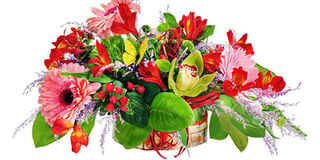Flowers are a sign of power in diplomacy

In Europe, flowers are a big deal. They’re cherished and venerated so much as to drive a multibillion-dollar industry. PHOTO | FILE | NATION MEDIA GROUP
What you need to know:
- They are emblems of life. They represent goodwill. They rejuvenate, trigger emotions, boost moods, enhance relationships.
- Shrewd states invest a fortune towards soft power. And cultural diplomacy, like dispatching flowers, though it may appear trivial to Kenyans.
The proposal to dispatch bouquets of fresh flowers to Britain — in solidarity with the Covid-19 struggle — piqued some Kenyans.
On Twitter, they sneered. They laughed it off. Some even thought it was sissy and the stuff of wimps. Others wondered why the State was too keen to flower London instead of adequately handling the Covid-19 Jinni right here.
Fair enough. But there is also a case for Flower Diplomacy. It’s an established tradition in diplomatic relations for sovereigns and diplomats to gift out their valued cultural iconic products.
Such gifts are emblematic. They express a nation’s uniqueness and prowess. They capture the spirit of the sending nation; the disposition of the moment. Gifts manifest the degree of friendship existing or desired.
Yet it appears that the spirit of compassion, friendship and solidarity that our flowers ought to have conveyed hardly struck a note at home.
Sadly, because of social media, the recipients of our solemn gesture quickly learnt that our gift is not coveted at home. That the flower culture is not in our psyche after all.
Yet the symbolism of our petals, the act of friendship, empathy and solidarity in times of a pandemic could not have come at a better time.
SOFT POWER
Our blooms are, in a small way, desired to lighten the spirit of Londoners. To win hearts and minds. It’s what renowned international relations scholar Joseph Nye calls soft power.
Indeed, petals have a very powerful psychological play. They are emblems of life. They represent goodwill. They rejuvenate, trigger emotions, boost moods, enhance relationships.
Their delicate petals and fragrance have no match in mankind’s primal urges for serenity.
In Europe, flowers are a big deal. They’re cherished and venerated so much as to drive a multibillion-dollar industry. It explains why Kenya earns a premium for her cuts.
In 2018, flowers earned Kenya a staggering Sh113 billion. The industry supports about 500,000 people. And Kenya’s cuts are premium for vividness and longevity.
CNN even thinks we are the “Flower Garden of Europe”. Such nation branding is powerful soft power. Who wouldn’t want to be associated with paradise in a tempestuous world? Shouldn’t we then take pride in that?
IMAGE BUILDING
Scholars of international relations know too well that a country’s reputation is a source of prestige and power.
Shrewd states invest a fortune towards soft power. And cultural diplomacy, like dispatching flowers, though it may appear trivial to Kenyans, is such a powerful force in image building and generation of positive perceptions.
But Flower Diplomacy did not start with Kenya. Nor will it end here.
No state is as big in Flower Diplomacy as the Netherlands. Known for her radiant tulips, the Netherlands has charmed the world as much as attracted millions of tourists every spring.
The Dutch even hold an annual tulips festival as a way of showcasing the country’s culture and finesse in floriculture.
Mr Wamanji is a communications adviser and an analyst of international affairs; email: [email protected]; Twitter: @manjis





